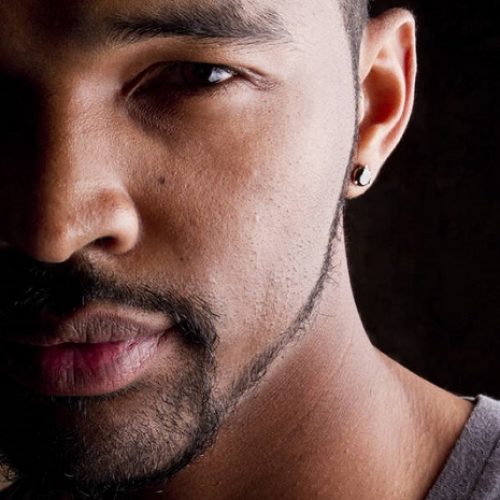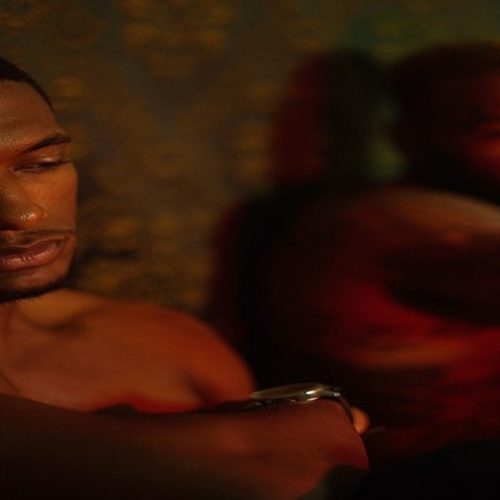“I Will Shoot You Here And Nothing Will Happen.” Jude Idada’s Story Of The Nigerian Police Brutality
They stopped me.
These men, dressed in black T-shirts, some with jackets on, some wearing face caps. And all of them wearing different shades of jeans, boots, and running shoes.
All of them with guns.
It was about 9.30 p.m. or thereabouts, and I was in an uber. The driver was going down the ramp from Carter Bridge toward CMS bus stop en route Victoria Island.
Just at the dark stretch where the trailers are parked at the side of the road and the cold waters of the Marina yawn towards the Apapa Port, they had mounted their checkpoint.
Flashlights in the dark pointed right in the face of the driver.
I was on my phone, speaking to a friend.
One of them shouted so loudly, you could hear it in the air-conditioned car. “Stop!”
The driver stopped.
There were two cars in front of us that had some of these men around them. There was one other car that was already parked by the side of the road, on the grass patch behind the trailers and containers, its occupants standing by it, being frisked and interrogated.
One of the gun-toting men came to my side of the car; I was riding shotgun. He shone his flashlight at me, peered closely at the wound-up window, and immediately shouted, “Park!”
The driver sighed and slowly drove to the side of the road, behind one of the other cars, and stopped. Two of the men walked alongside the car once it stopped.
The one on the side of the driver shouted again, “Oya, come out!”
The driver switched off the ignition and stepped out. I remained seated, speaking on my phone.
The same man shouted again, “Open your boot!”
The driver leaned back in and did as instructed, pulling the lever that was somewhere beneath the dashboard. And he straightened back out of the car.
Just then, the same man shouted, “Wetin the other man dey do inside the motor? E no hear wetin I say?!”
The man on my side of the car tapped on the wound-up window. I looked up at him, his flashlight in my eyes.
The man who was with the driver shouted, “Tell that bastard to come out of that car before I change am for am na-na!”
I told my friend that the men had stopped me and that I had to go. Then I hung up, opened the door, and stepped out.
The cool breeze from the Marina greeted me.
The second man stood there in front of me, his gun hanging from a sling on his shoulder.
I managed a smile. “Good evening, officer.”
“Good evening, how are you doing?” His voice was surprisingly calm and friendly.
“I am fine, sir.”
“May I know you?”
“No problem, sir. I am Jude Idada.”
“Jude Idada?”
“Yes, sir.”
“That is a powerful name. Is it because of this your dada on your head?”
I laughed and responded, “Partly, sir.”
“I see.”
He looked at me for a moment and his eyes strayed to my bag which was on the floor of the front passenger compartment. Then he looked back at me. “What does Jude Idada do?”
“I am a writer, dramatist and filmmaker, sir.”
“Nollywood?”
“I do some work in the industry, sir.”
“Anyone I have seen?”
“I am still a learner, sir.”
“You a learner?” he queried, clearly disbelievingly.
“Yes, sir.”
“I don’t believe it.”
“Why, sir?”
“You look like a Yankee, all those people that have come back from America. You cannot be learning work. You think I will ask you for dollars if you tell me the film you have made?”
“Ah sir, you are too big to be asking me for dollars, sir.”
He smiled. “Can I see what is in your pocket?”
“No problem.”
I emptied my pockets as I spoke, “House keys… Face towel… Wallet…”
He looked at the wallet.
I could hear the other man shouting at the driver.
The man in front of me spoke again, “Let me see what is in the wallet.”
I opened it and continued speaking. “My bank card, you can see my name written on it, Jude Idada. These are business cards of some people I’ve met, and some cash.”
“Nothing there to identify you?”
“I was robbed a while back and my wallet was stolen, sir.”
“Did you report it?”
“No, sir.”
“Why?”
“I wanted to but just got too busy.”
“So nothing inside was important?”
“There was, sir, but I can replace them, maybe apart from the money.”
“Okay, what is in your bag?”
I turned to it. “Can I open it and show you?”
“Yes.”
I reached in, careful not to block his view, lifted the bag and placed it on the seat, opened it, and began to bring out the contents. “My books, you can see my name on them. Jude Idada. I actually had a meeting earlier so I took them with me.”
“Let me see one.”
I handed it to him.
He looked through it for a moment. Then he said, “Can I take it?”
“Oh please, for sure.”
“Thank you, but I won’t have time to read, so let me not steal money from your pocket.”
He handed it back to me. I collected it and turned back to the bag, as I made to bring out the sunglasses case that was in it.
He spoke, “It’s okay. You can go.”
I straightened up and smiled. “Thank you, sir.”
“You are welcome.”
“And thank you for your service.”
“God bless you for that.”
I turned back to the car, placed the bag on the car floor, and moved to sit down, when I heard the other man shout at me. “Who told that man to enter his car?”
I stopped mid-motion.
The man who had searched me spoke in response, “I don search am.”
He didn’t respond to the man but spoke even louder at me. “If you enter that car, I swear I will rubbish you here!”
I straightened back up and turned to his direction. He was walking over to me and stopped a very short distance away. The odour of weed and alcohol wafted to me from him.
“Did I tell you to enter your car?”
I gestured toward the other man, who was standing some metres away. “He said I can go, sir.”
“Is he me?”
“He was the one searching me, sir.”
“Was he the one that stopped you?”
“You both stopped us, sir.”
“How will you know who stopped you, when you were pressing phone?”
“He was the one that said we should park, sir.”
“I am lying, ba?”
“No, sir. Maybe you wanted to stop us but he stopped us before you, and you –”
“You are telling me what I wanted to do at my job but didn’t do at my job?”
“No, sir. I am just…”
The other man butted in, “I don search the man. Abeg leave am make e go.”
The weed-smelling man turned to the intervening man. “My friend, you no go leave me make I do my job?”
The other man kept silent.
I glanced over at the driver. He was still standing by the booth. The other men were stopping cars, letting some go, and ordering the others to park. The car that was stopped before me had left. The breeze was still blowing. The night was still unraveling.
The weed-smelling man turned back to me. “Where is your phone?”
“Here, sir.” I showed it to him.
“Give it to me.”
“Why, sir?”
“You are asking me why?”
“The other officer has searched me and –”
“Am I the other officer or is he me?”
“I have identified myself to –”
“Do I know you?”
“I am Jude Idada. I told him that I –”
The other man butted in again, “Abeg, make the guy go.”
He turned to him again. “Wetin be this? Eh? Wetin you dey try do?”
I quickly started a conversation with my friend on WhatsApp about what was happening.
I was in mid-type when he turned back to me and said in disbelief. “You are pressing your phone?”
I continued.
“If you touch that phone again, I swear to God, I will fire you hia!”
He lifted his gun, cocked it, and pointed it at me, chest level.
I stopped.
There was a moment.
I could feel the cool breeze at the back of my neck and the stillness of the night. Every sense in me was attuned to the gun as it stared at me menacingly.
My mind was crystal clear, and all I could hear was me saying in a low tone, “Don’t do anything stupid.”
I don’t know if I was saying those words to me or to him.
But I kept repeating it in my mind as the time – which I now know was very short, but at that time seemed like forever – played out.
He stepped toward me. His voice was hoarse and angry. “You think I am joking with you? You think this is a game? Look at this bastard! I am asking you to give me your phone for searching and you are chatting.”
“I am sorry, sir.”
My voice was even calmer than I thought I could manage in the circumstances.
He left the gun in one hand and reached out for the phone with the other hand. “Will you give me that phone?”
I handed it over.
“I will shoot you here, send a message to the person you are chatting with to come and carry your dead body, and nothing will happen!” he snarled.
“I am sorry, sir.”
“I will kill you here like a fowl and nothing will happen.”
“I am sorry, sir.”
“Who do you think you are?”
“Nobody, sir.”
“You are reporting me, ehn? Who are you chatting with?”
“My friend, sir.”
“Who is your friend?”
“A nobody, sir.”
“You are reporting me to a nobody?”
“No sir, I wasn’t reporting you.”
“You think I am a fool? Let your friend come and arrest me. Your friend is a big man ba? You think a big man can come here and tell me how to do my job? I will kill you here, and let us see how your big man friend can come and resurrect you. I will shoot you here and we will see if your big man friend is Jesus.”
“I am sorry, sir.”
“You think because you are big. Is it your size that is fooling you? I will drop this gun and we will fight here man to man and you will see if you can beat me.”
“I am sorry, sir.”
“You are a bastard!”
“I am sorry, sir.”
“I said you are a bastard!”
“I am sorry, sir.”
He waved the phone at me. “Tell your big man friend that I said you are a bastard and that I will shoot you here and you will die. Let me see whether he can magic himself here before I pull this trigger.”
The other man walked closer to us, speaking in a placating voice, “E don do na, haba.”
The foul-tempered man turned to him, shouting, “Leave me alone! Let me do my job! I will shoot him here and nothing will happen!”
The other man continued, taking him gently by his hand and leading him away. “The guy don talk say e sorry, forgive am, make e go.”
They walked further away. Two others joined them.
“No o! E wan prove say e know big man ba. I go show am say for this country, poor man go kill you. The only thing big man fit do na kill poor man back, but e no fit resurrect you.”
“E don do na.”
“I dey talk to am, e dey press phone. Which kain insult be dat? E dey report me. Who dat big man when e get be sef?”
The vituperating man began to do stuff on my phone which I couldn’t see. I watched them from the car where I stood. He was fiddling with my phone as the other three tried to placate him. And their colleagues kept aiming their flashlights at cars that were slowing down for the scrutiny. And one of them remained with another car that had been parked a short distance from us, speaking to the driver.
The driver of my uber remained standing by the open boot of the car. He was staring at them and not at me.
I began to think of how often this plays out all over the country, and how it can very easily go south for anyone who finds themselves at the complete mercy of these gun-toting men who carry the insignia of the Nigeria Police Force.
An escalation that could lead to death in a confrontation with these thin-skinned and egocentric armed men, who society has failed in so many ways. And thus, they have in turn decided to lash out in unconscious protest and rebellion against those they are meant to protect.
They were victims as we are victims, victims of ourselves and our collective dysfunctionality.
The system that we call our enemy is us.
We are our enemy.
How many times have we protested for their welfare? How many times have we asked the salient questions as to how they live, are trained, are rewarded, are motivated? Did we take to the streets when we heard that a couple of people had stolen their pensions? When we drive past their barracks and see how decrepit the buildings are, do we take pictures and start a social media warfare on their behalf? When we hear that they haven’t been paid in months, what do we do?
We instead call them thieves and crooks and all the shame-inducing epithets we can muster, even when we partake in our way in the crime that we accuse them of.
They are a product of our malfeasance, and like the leadership we abhor, they are us.
If we must accuse them and fight against them, we must accuse ourselves and fight against us.
There are few men of whom so little is expected, and for whom there is hardly any respect, that would come to work daily to give their best. We create them, as we create the system that takes us all hostage by the daily confession and profession of our words.
These words that we use to tear down and not to build up, to castigate and not to motivate, to curse and not to bless; we are all guilty.
Them, us, they, you and me.
I stood there staring at him as he scrolled through my phone as the others spoke to him. And there was no hate or anger in me. Just me wishing that the goodness, fairness and just equity of life happen to him. That it may from the inside change him. For no man is born accursed. Time and chance and the decisions we take from the opportunities and capacities we have are those which create who we are and what we become.
Some minutes later, the man who searched me initially walked over to me. There was a sad smile on his face as he handed my phone to me. “I am so sorry, sir. He gets like this sometimes. Even we call him ‘mad dog’. We are just managing him and hoping he will start behaving. But to be honest, he is one of the best we have. Armed robbers fear him. That is why everyone just tolerates him when he gets like this sometimes. But God knows that it is this work. It can make you mad sometimes.”
I collected the phone and said with as warm a smile as I could invoke from the core of my soul, an honest smile: “Thank you very much.”
“It is you we should thank. You have been very patient and understanding.”
“I try.”
“God bless you, sir.”
“God bless us all.”
Written by Jude Idada
About author
You might also like
Under Construction: Kitchen Sink
…because a kitchen sink to you is not a kitchen sink to me. It hardly is black and white. Happy or sad. Good or bad. Okay or not okay. Much
SCENES OF NO TOMORROW (PART 2)
Previously on SCENES OF NO TOMORROW… * During the period I was grieving the loss of my innocence, my roommates and some course mates assumed I’d fallen ill, because of
MY SERENDIPITY
1. I remember the first day I agreed to risk meeting you after months of chatting online. There was no rush. There was no anticipation or excitement. I had given










7 Comments
Xhris
October 01, 11:19Oh wow…. This is rather a different perspective that I haven’t thought of. Them being a victim of circumstances, just like us.
The country failed us all, no one is spared.
Thanks for this, its a new view entirely.
Thanks ❤
T-man
October 01, 14:19I have never been stopped by the Police and honestly, I still wonder if I could display similar calmness if I get into an entanglement with those whimsical clowns. You really did well, Jude. Fear the NPF, don’t ever think they make empty threats.
bamidele
October 01, 15:42Well said.
As I often said, Nigeria’s problem extends everywhere. Blaming individual parastatals, groups, persons, won’t work,. The foundation has been terrible! Things have fallen apart. The system merely destroys people.
Nathan Bloom
October 02, 22:13While I understand the writer’s point. I don’t take my frustration out on the next helpless person because the same system is messing with us.
Pink Panther
October 03, 09:19EXACTLY!!!
Oba OF Benin
October 03, 23:35MAD DOG………. i know that douchebag right from BORNO state
Roland
October 06, 12:00Please, does anyone know any published play on this story here?